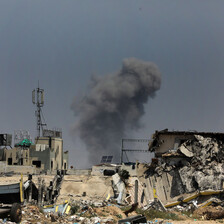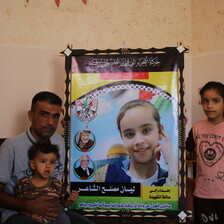The Electronic Intifada 26 January 2025

Hassan Abu Sharekh, left, and the author before a wedding party.
The first time I met Hassan Abu Sharekh was in 2018, when we were in the same class in the English department at the Islamic University of Gaza. We became friends the very first day.
Hassan, with his smiley face and sharp but never unkind sense of humor, brought joy to everyone around him. He wanted everyone in his life to be happy and was beloved by everyone – students and professors alike.
He truly cared about his friends’ feelings, a quality that isn’t common among young men. He did his best to create a loving and welcoming environment for everyone in our class. He planned group outings, surprise birthday parties and visits to one another’s homes to bring our circle of friends closer together.
He once invited a group of friends from our class to his apartment and cooked for us the best maqlouba – a traditional Palestinian dish – I have ever tasted.
We did everything together. We ate breakfast together every day, attended classes together and went out together afterward, whether it be to a café or a restaurant or to play cards, pool or video games.
Hassan, who never wanted to miss an opportunity to spend time with friends, would persuade me to go out despite my reluctance.
“Come on! Let’s go out with our friends, have fun and make great happy memories for the future,” he would say. “Who knows? We might not be able to have fun then.”
It worked every time. Now I see the wisdom and foresight in his words.
Hassan was always supportive of his friends and cheered for me from the audience when I performed in a production of Hamlet at the Islamic University Theater. To compliment my performance, he called me “Al Pacino al-Naami” in reference to the American actor.
I remember him waving to me in the middle of the crowd at my graduation party. He was always there for me.
After graduating, our relationship grew even stronger. We both got jobs in teaching – he excelled in this role and parents would specifically request him to teach their kids. We would swap advice and and share our experiences with one another before Israel’s genocide turned our lives and plans upside down.
Unfulfilled promise
A few days before the ceasefire was announced, Hassan called me on the phone and told me that he was going to visit Deir al-Balah in central Gaza, near where I live, and asked me if we could meet and catch up. I was very excited, as I hadn’t seen him in about four months. I left my home in al-Magazi camp and went to go meet him.
We bought two cups of tea and sat together for around three hours. We found respite and joy in the midst of the genocide by recalling happy memories from our college days. He told me with excitement that he had been accepted for a position teaching English online to pupils in Gaza after he lost his previous job due to the war.
Time flew by quickly that day and when it was time to leave, I walked with Hassan until he found a car to take him to his tent in the al-Mawasi area in Khan Younis in southern Gaza. We hugged and promised to meet again in a few days.
Last Wednesday afternoon, about a week after my meeting with Hassan, I called my friends one by one to congratulate them on the ceasefire and to check on them. I was particularly excited to call my friends who were displaced from Rafah and northern Gaza to ask them about their plans to return to their homes.
I called Hassan twice but he didn’t pick up. I didn’t worry, figuring that he had forgotten to charge his phone, as he tended to do, and that his battery was dead.
I would later find out that Hassan was critically injured by Israeli bullets around the same time I was trying to call him. 
From left: Hassan Abu Sharekh, the author and three friends on their way to play football after class.
That evening I got a phone call from a friend asking me if I heard the news that the Israeli army opened fire on five Palestinians, killing one and injuring four others. With a bitter tone, he said that our friend Hassan Abu Sharekh had been severely injured while he was on his way to check on his home in Shaboura camp in the center of Rafah.
I was in shock. My friend’s words were clear yet I couldn’t understand how and why. The Israeli genocide was supposed to be over. Why did they shoot him? He was on his way to check on his home. He wasn’t a threat.
I didn’t sleep for most of the night. I thought about Hassan and prayed that he would get better and survive.
I woke up early the next day to the devastating news that Hassan had died due to the severity of his injuries. It felt like my heart had been ripped out of my chest. I was so shocked that I couldn’t even cry.
I couldn’t accept the idea that Hassan was killed and buried and I wouldn’t ever see him again after we met just a few days before the beginning of the ceasefire.
Crushed hopes
For 15 months, I was terrified of losing a family member or a beloved friend to Israel’s relentless attacks on all corners of Gaza. After the ceasefire, that fear began to ebb. Any relief I may have felt has proven to be illusory.
A few days have passed since the ceasefire began and here I am, broken-hearted and writing about my best friend in the past tense.
As I scroll through my photo library, every image of Hassan and me together brings a flood of memories and feelings.
The countless happy memories that Hassan created and the positive impact that he had will live in our hearts forever. His shed blood bears witness to Israel’s brutal crimes, which did not end with the declaration of a ceasefire.
I had hoped that the ceasefire would be the end of the bloodshed of my people in Gaza and allow us to heal our wounds – both physical and otherwise – and begin to rebuild. Had he lived, Hassan would have become one of the best teachers in Gaza, which has been robbed of so much of its talent and potential.
But my hopes have been crushed as Israel continues to kill Palestinians across the Gaza Strip, including my best friend, Hassan Abu Sharekh.
All photos courtesy of the author.
Abdallah al-Naami is a journalist and photographer living in Gaza.





